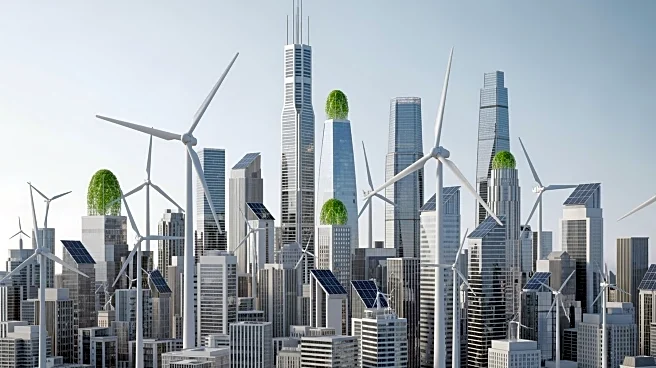What's Happening?
The European Union is advancing its zero-emission trajectory, aiming for a significant reduction in CO2 emissions from new passenger cars by 2035. According to a report by the International Council on Clean
Transportation (ICCT), the EU's CO2 performance standards have effectively catalyzed market transformation, with electric vehicles (EVs) gaining a substantial share of new car registrations. The report highlights the EU's progress in deploying charging infrastructure and the economic advantages of EVs, which are cheaper to operate than traditional vehicles. However, challenges remain in securing the battery supply chain and ensuring workforce re-skilling to support the transition.
Why It's Important?
The EU's zero-emission strategy is crucial for reducing energy dependency and achieving climate targets. The transition to EVs offers significant public health benefits, including reduced tailpipe emissions and lower particulate matter emissions. Economically, the shift presents opportunities for the EU's industrial base, as it is currently a net exporter of EVs. However, maintaining this competitive edge requires securing the battery supply chain and addressing workforce re-skilling needs. The transition also supports the EU's goal of reducing reliance on fossil fuel imports, aligning with broader economic and environmental objectives.
What's Next?
The EU must focus on locking in the industrial and social components of the zero-emission ecosystem. This includes sustained policy certainty, targeted financial support for domestic battery manufacturing, and aggressive scaling of workforce re-skilling programs. The EU's regulatory standards have accelerated EV uptake, but continued efforts are needed to ensure a complete and equitable transition. The European Battery Academy and Automotive Skills Alliance are essential platforms for aligning workers' skills with the demands of the new electromobility ecosystem.
Beyond the Headlines
The transition to a zero-emission future involves ethical and social dimensions, particularly in ensuring a 'just transition' for workers affected by the shift. The EU's strategy also highlights the importance of integrating renewable energy with EVs to minimize grid reinforcement costs. The report underscores the need for concerted efforts to avoid losing the manufacturing value chain to global competitors, emphasizing the strategic necessity of electrification for corporate viability.











